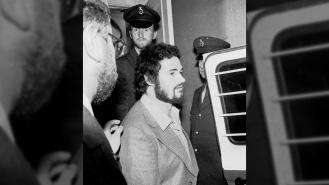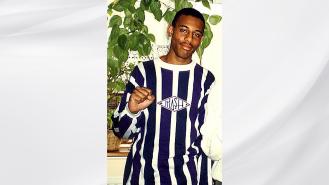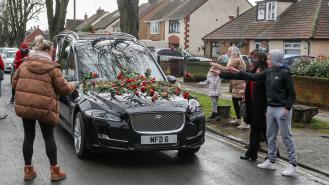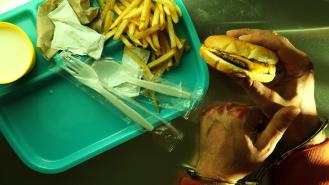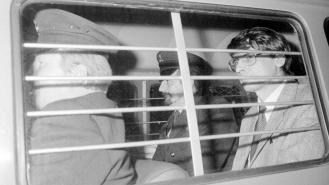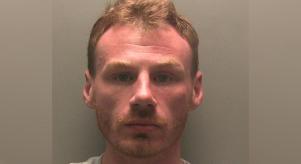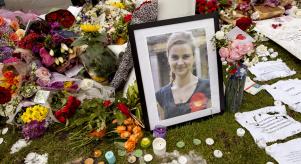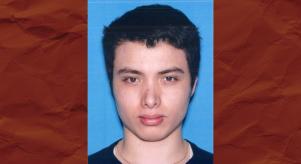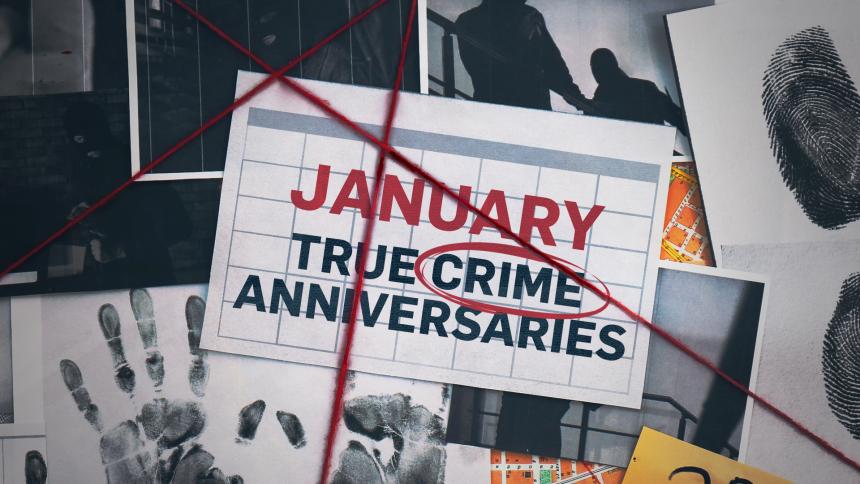
True crime anniversaries in January
Each month, Crime+Investigation looks back on some of the most significant crime anniversaries and explores some of the biggest cases in recent history.
Read on to discover some of the most infamous true crime anniversaries from the month of January.
2nd January: The police catch up with the Yorkshire Ripper (1981)
Peter Sutcliffe, or the Yorkshire Ripper as he became known, was stopped by police on 2nd January 1981. The check revealed he was driving using false number plates, and Sutcliffe was arrested and taken to Dewsbury Police Station. There, he was questioned regarding the Yorkshire Ripper murders as he matched many of the known characteristics of the serial killer. During the investigation, he slowly confessed to his crimes.
Sutcliffe officially murdered 13 women, injured seven others and is suspected to have injured two more and killed at least one other. His attacks on sex workers across Yorkshire took place between 1975 and 1980, and it was only this routine stop that led to his eventual conviction.
2nd January: Charlene Ellis and Letisha Shakespeare are shot in Birmingham (2003)
Two friends in their teens were shot simply for being in the wrong place at the wrong time. Charlene and Letisha were both just 17 years old and leaving a party when they were murdered in Aston, Birmingham. They weren’t targeted in the murders, but simply collateral damage in an ongoing gang war.
Four men were convicted of murder and attempted murder in March 2005, and the trial made history as it was the first to allow secret witnesses. The perpetrators also included a cousin of one of the victims. The crime shone a light on the very real problem of gun crime in inner city areas and how gang warfare was impacting those beyond the individuals involved.
3rd January: David Norris and Gary Dobson finally convicted of the murder of Stephen Lawrence (2012)
The murderers of schoolboy Stephen Lawrence were finally brought to justice in January 2012. After 19 years, Stephen's murderers were convicted for their part in the racially-aggravated attack and murder in 1993. Norris and Dobson were both in their 30s by the time of their conviction. Scientific evidence and covert video footage tied both Norris and Dobson to the crime.
3rd January: The fatal stabbing of Olly Stephens (2021)
Olly Stephens was a 13-year-old schoolboy fatally stabbed not far from his home in Reading, Berkshire. The police investigation found a 14-year-old girl had lured him to the field where he was attacked by two boys aged 13 and 14. In July 2021, the two boys were convicted of murder and sentenced to a minimum of 12 and 13 years of imprisonment. The girl who lured Olly to the field was also convicted of manslaughter.
The murder gained considerable media attention because of the calculated nature of the attack and the young age of those involved. It led to more scrutiny of the use of social media and his parents called for better regulation of social media companies. None of the perpetrators of the crime can be named due to their age.
10th January: Appeal for Anders Behring Breivik begins (2017)
Gun massacres are always shocking but the actions of Norwegian mass shooter Anders Behring Breivik set a new precedent. He killed 77 people, including 69 teenagers, in a meticulously planned attack in 2011. His motivation? Neo-Nazi ideologies.
Breivik was sent to jail but in 2016 the Oslo District Court ruled that his human rights had been violated in detention, referencing issues like solitary confinement and strip searching. On 10th January 2017, the Norwegian Ministry of Justice and Public Security launched an appeal to overturn the original ruling.
The ongoing trial forced not just Norway but countries worldwide to confront the dangers of unchecked hate and radicalisation. It also sparked questions about Norway’s unwavering commitment to its legal principles. Despite the scale of his crimes, Breivik was granted the same rights as any defendant.
13th January: Serial killer Harold Shipman kills himself in his cell (2004)
Harold Shipman hanged himself in his cell at HMP Wakefield on 13th January 2004. He was 57 years old and had been convicted of murdering 15 patients under his care four years earlier. Shipman targeted vulnerable elderly people who trusted him as their doctor. While he was only convicted of 15 murders, the actual number of people he killed could be as many as 250.
Many of the victims' families felt they had been cheated when Shipman killed himself as it removed the possibility of him ever confessing or giving answers as to why he committed his crimes.
15th January: The Black Dahlia Murder (1947)
Elizabeth Short’s dream was to make it in Hollywood. But on 15th January 1947, her life came to a brutal end. Short’s body was discovered by a mother and child strolling around a Los Angeles neighbourhood. It was mutilated in a way that horrified even the most seasoned investigators. The media frenzy that followed turned Elizabeth into a symbol of the darker side of Hollywood.
Despite countless theories and suspects, Elizabeth’s killer was never caught. The Black Dahlia Murder remains one of America’s most interesting cold cases.
24th January: The execution of Ted Bundy (1989)
Ted Bundy was handsome, articulate and seemingly ordinary. Everything a serial killer isn’t supposed to be. Yet behind his polished façade was a predator who confessed to the murders of at least 30 women across multiple states in the 1970s.
Bundy was executed at Florida State Prison on 24th January 1989.
His case transformed the way law enforcement approaches serial crime and catch killers. Bundy’s manipulation of the media and the legal system exposed alarming gaps in investigative processes. They eventually led to innovations like psychological profiling and strategic interrogation, which continue to play a vital role in preventing and solving murders.
24th January: The honour killing or Banaz Mahmod (2006)
Banaz Mahmod was a 20-year-old British-Iraqi woman murdered on her family's orders due to her life and relationship choices. Banaz's family was strictly made up of traditional Kurdish people. At around 16 years old, Banaz was forced into an arranged marriage with a much older man from the family's hometown in Iraqi Kurdistan. Banaz frequently came into contact with the police during her marriage as she was repeatedly beaten and raped by her husband. Her family knew about this but said she must remain in the marriage to avoid disgracing the family.
In July 2005, she left her husband and began a relationship with a new partner. Her family simply couldn't accept this and on her father's orders, with the help of her uncle, her murder was arranged. Banaz repeatedly went to the police, informing them her family was threatening and plotting to kill her. However, police officers did not believe her and infamously, PC Angela Cornes referred to Banaz as manipulative and melodramatic.
On 24th January 2006, Banaz was raped, tortured and strangled to death by Mohammed Saleh Ali, Omar Hussain and Mohamad Hama. Her father, uncle and three cousins were all convicted of her murder.
26th January: Dennis Nilsen kills his final victim (1983)
Dennis Nilsen is one of Scotland's most prolific serial killers. He murdered at least 12 young men and boys between 1978 and 1983. Nilsen was also a necrophiliac and used to keep his victims for some time after their deaths.
On 26th January 1983, Daniel killed his final victim, Stephen Sinclair. Stephen was just 20 years old and was last seen by acquaintances heading off with Nilsen towards a tube station. Nilsen followed his usual pattern of getting his victim into an incapacitated state with drugs and alcohol before strangling him using a ligature. He was sentenced to life imprisonment in November 1983.
30th January: The murder of Robert McCartney (2005)
Nobody understands the bloody reputation of the Irish Republican Army (IRA) better than the family of Robert McCartney, a Belfast man who was stabbed to death outside a bar in 2005. Police still haven’t charged anyone with the death of the 33-year-old forklift truck driver, though many believe the IRA pulled off a frantic coverup on the night of January 30th, 2005. Robert’s sisters are still fighting for justice and maintain that senior IRA commander Gerard ‘Jock’ Davison, who was shot and killed in 2015, orchestrated the murder.
It's not the first time the IRA has been accused of murder. From the early 1970s the Irish paramilitary force launched a series of deadly attacks in the UK, including multiple bombings in London. The IRA has also been linked to a Belfast Bank robbery worth £26 million.
Sign up to the Crime+Investigation newsletter
Love true crime? Stay in the know with the Crime+Investigation newsletter! Get exclusive access to new articles, episodes, clips, competitions, and more — delivered weekly and completely free. Don’t miss out — sign up today!
